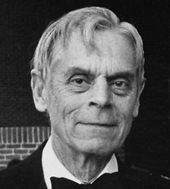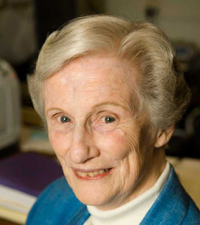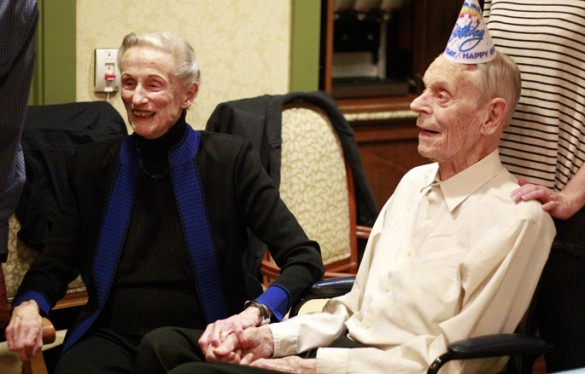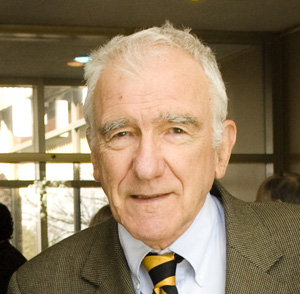Charles Rawlinson “Rollo” Park, M.D., a pioneering diabetes researcher at Vanderbilt University Medical Center, died Saturday, May 7, at his home in Brentwood, just two months after celebrating his 100th birthday on March 2.

A memorial service will be held at 11 a.m. Friday, May 13, at Christ Church Cathedral at 900 Broadway. Visitation will be immediately prior to the service at 10 a.m.
Dr. Park, who chaired the Department of Physiology from 1952 to 1984, made several key discoveries about glucose uptake by muscle and glucose production by the liver. He is credited with establishing the nation’s first Diabetes and Endocrinology Research Center at VUMC in 1973.
Perhaps his greatest contribution was the recruitment and training of dozens of scientists who went on to have distinguished careers.
Among them: Alan Cherrington, Ph.D., the Jacquelyn A. Turner and Dr. Dorothy J. Turner Professor of Diabetes Research, was recruited as a research fellow. Dr. Park “was, in fact, the primary reason I spent my career here focused on diabetes-related research,” Cherrington said.
“I owe him a great deal.”
“He expected and encouraged his students and postdoctoral (fellows) to be truly innovative and to meet the highest standards,” said longtime colleague John Exton, M.D., Ph.D., professor of Molecular Physiology and Biophysics. “His contributions to science, and to his department and Vanderbilt, were immeasurable.”
Jackie Corbin, Ph.D., professor of Molecular Physiology and Biophysics, emeritus, described Dr. Park as a “renaissance man,” who was strongly attracted to the arts and the outdoors. “He was compassionate toward those who were downtrodden,” Corbin said. “I will truly miss him.”
Dr. Park earned his bachelor’s degree from Harvard University in 1937 and his M.D. in 1941 from Johns Hopkins University. After an internship at Hopkins, he was chief resident in Medicine at Boston’s Peter Bent Brigham Hospital.
During World War II, he served in the U.S. Army as a captain at Fort Knox, Kentucky, where he studied thermal regulation in soldiers exposed to desert-like conditions.
In 1946, he went to Washington University in St. Louis to investigate questions of basic metabolism as a post-doctoral fellow in the laboratory of Nobel Laureates Carl and Gerty Cori.
Here Dr. Park met his future wife, the former Jane Harting. She earned her Ph.D. in 1952 — the year Dr. Park was appointed chair of the Department of Physiology at Vanderbilt. They were married on Aug. 26, 1953, and she joined the Vanderbilt faculty the next year.
With others, Dr. Park carried out classic experiments on the effects of insulin, growth hormone and glucocorticoids on glucose transport and phosphorylation in perfused rat hearts.
Among other discoveries, they demonstrated that insulin acts by promoting the transport of glucose across the muscle cell membrane, and they were the first to identify the role of the hormone glucagon in stimulating gluconeogenesis — the production of glucose by the liver.
“These studies helped create the foundations of our modern understanding of the physiology of insulin action, carbohydrate metabolism and the pathophysiology of diabetes,” said Roger Cone, Ph.D., chairman of the Department of Molecular Physiology and Biophysics at Vanderbilt.
During his 32-year tenure as chairman, Dr. Park gained for the Department of Physiology national recognition in the area of insulin action and diabetes research. He was instrumental in developing many successful programs at Vanderbilt, and was a founding member of the board of the Howard Hughes Medical Institute.
In recognition of his research accomplishments, Dr. Park was awarded the Harvie Branscomb Distinguished Professorship by Vanderbilt University in 1968.
In 1979 he received the American Diabetes Association’s Banting Medal, its highest honor, and in 1980 he was elected to the National Academy of Sciences. Vanderbilt awarded him the Earl Sutherland Prize in 1984, and in 2015, the American Physiological Society named him to its Inaugural Class of Fellows.
Dr. Park is survived by his wife, Jane Park, Ph.D., professor of Molecular Physiology and Biophysics, emerita, their son Edwards (Vicki), two grandchildren, Ellen and Rebecca, and by many nieces and nephews.
Memorials may be made to the Charles Rollo Park Lectureship in Diabetes and Metabolic Disease in the Department of Molecular Physiology and Biophysics at Vanderbilt University School of Medicine or to the charity of one’s choice.















